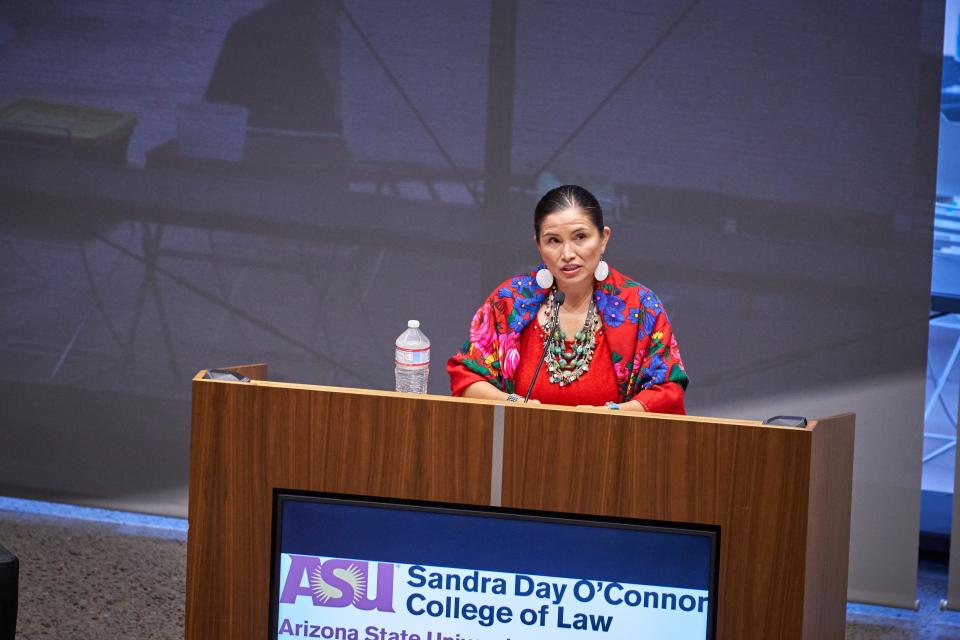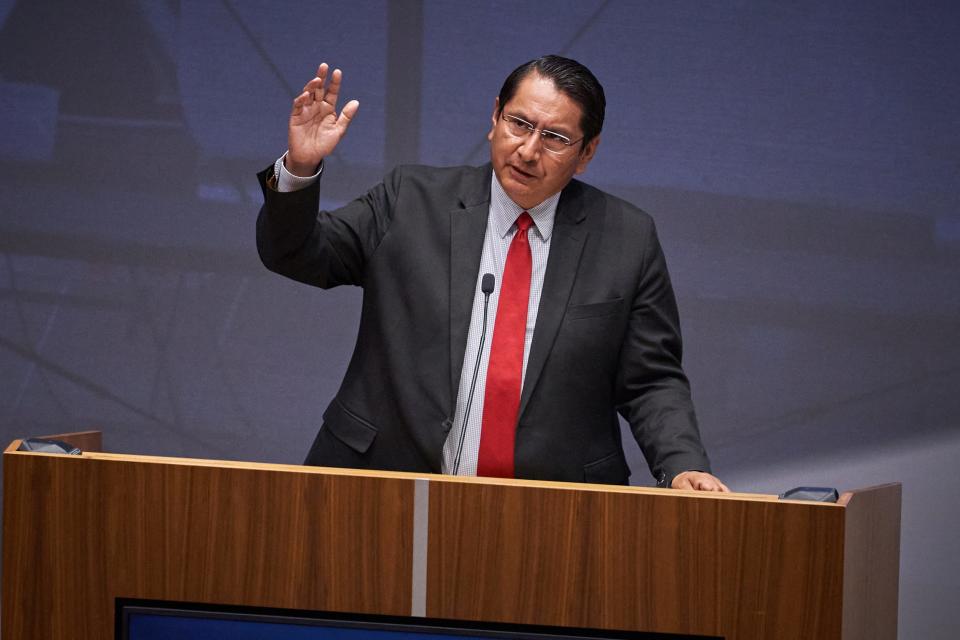At Navajo Nation presidential forum, candidates say hot button issues should go to voters
Navajo Nation presidential candidates say for the most part that hotly debated topics like abortion rights, marijuana legalization and same-sex marriage should be settled "by the people."
The Navajo Nation has always taken different stances and approaches when it comes to key issues compared to the states that surround the largest tribal lands. For example, the response to COVID-19 has always been to protect elders and the most vulnerable, which is why strict mandates were put into place.
So when candidates at a forum earlier this month were asked about their thoughts on gun control, abortion, same-sex marriage and legalization of marijuana, the answers were mostly in tune with giving these important decisions to the people to make.
“When you think of the government and how it works, this is not something that is dependent on me as a leader,” said candidate Greg Bigman. “This is the rights of the people. When we see conflict in law between our traditional knowledge and our customary laws, these are things that need to go to the people. That referendum is what protects our people’s rights.”
After Roe decision: Indigenous law experts say it's wrong to expect tribes to offer 'safe harbor' abortions
The Navajo Nation presidential primaries are slated for Tuesday. Of the 15 presidential candidates, 12 gathered at Arizona State University's Sandra Day O'Connor College of Law for a forum hosted by the Indian Legal Program.
During the first hour, candidates were given the chance to introduce themselves to the audience before they were each given a minute to answer a variety of questions that ranged from how they would work to preserve the Navajo language to their thoughts on abortion rights.
“The Navajo Nation Code said it's a fundamental right for Diné citizens to choose a candidate of their own choice,” said Derrick Beetso, director of the Indian Gaming and Tribal Self-Governance Programs at the law school. “The purpose of today’s event is that we have informed Navajo voters participating in this upcoming election.”
Questions were submitted by audience members and they included: How would leaders address decline in Navajo language fluency? Why did the Navajo judicial branch did not receive as much of the $1.1 billion ARPA funding as the executive and legislative branch? How will leaders help Navajos with housing on and off the Navajo Nation? And how will leaders address the issues regarding grazing permits on Navajo, especially transferring it through probate?
Solutions on Navajo Nation can differ
The Navajo Nation has never elected a woman as Navajo President or Vice President, but in this election, there are six women running for the executive office. Former Navajo attorney general Ethel Branch said she supports a woman's right to choose, that gun control is needed, that same-sex marriage should be allowed and that she has an open mind when it comes to legalizing marijuana.

Although the topics are debated in many political races, there are differences in how Navajo Nation leaders would approach them.
Abortion is not easily provided because the Hyde Amendment bans the use of federal dollars to fund any type of abortion care except for rape, incest and if a mother's life is in danger. Indian Health Services or Public Law 638 facilities located on any tribal lands have to adhere to the Hyde Amendment because they are federally funded.
Same-sex marriage is void and prohibited under the Diné Marriage Act passed in 2005, and legislation to change that would require a vote by the Navajo Council before it goes to the president for his consideration to make it legal. Marijuana remains illegal.
When it comes to elected Navajo leaders, political party affiliation isn’t necessarily an important aspect for Navajo voters.
Incumbent Navajo Nation President Jonathan Nez acknowledged that the Navajo Nation is a matrilineal society, where women are the head of the home, and that means a woman should make her own decisions when it comes to her body. On the subject of same-sex marriage, he said this should be a decision made by the people through referendum because it holds more weight than a legislation passed by the tribal lawmakers.

While the forum was held at a public university’s law school, and many of the candidates hold masters degrees, Ph.Ds, or law degrees, a question on how candidates would address higher education for their citizens wasn’t asked.
Arizona State University has more than 4,000 Indigenous students, who are part a metro area where the American Indian and Alaska Native population increased by 4,832 to 208,094, according to the 2021 Population Estimates from the U.S. Census Bureau.
Crystal Carr, director of legislative affairs and special projects at Diné College, said Navajo Nation is in a unique position in that it has two tribal colleges. Some tribal nations don’t even have one.
“Diné College and Navajo Technical University are the hubs for innovation and educating our next generation and leaders,” said Carr. “These higher education institutions should be held in high regard to be leading research institutions for the Navajo Nation. Our next Navajo Nation president should understand this and provide support for our institutions who are not currently guaranteed funding from the Navajo Nation.”
The question of why some of the $1 billion of the American Rescue Plan dollars wasn’t given to the judicial branch of the Navajo Nation was asked during the forum, but Carr pointed out that higher education institutions were not even on the list to receive funding.
“Our next Navajo Nation leaders should not easily dismiss our institutions and education when it comes to funding education for our youth,” she said.
Marijuana debate: Legalizing hemp on the Navajo Nation could be good for business, but what's next?
Forums aren't the only way to hear candidates
The forums have been ongoing throughout the summer, and streamed online for those who haven't been able to attend. The forum at the law school brought the candidates to the urban Navajo population, but for some, the forums aren’t only a time to hear the candidates, but a time to analyze what is being said.
Navajo podcasters Majerle D. Lister and Cody Artist cover Navajo life from their perspective on their show. Their podcast is a mixture of political and cultural commentary, along with some personal stories, all showcasing Navajo living. They say they try to make their podcast as humorous and informative as possible. This election season, they have been covering the presidential race.
Lister, a Ph.D student at the University of Arizona, and Artist, a graduate from the University of Idaho College of Law, have mainly been watching the forums as they are live streamed. Lister said he's gone to two forums in person, but for the most part he's been watching them online.
“I didn't see Diné over the election via podcasting, let alone give analysis on the candidates based on their knowledge of the candidates, forums, and history of Navajo government,” said Lister. “Podcasting has become a popular media during the pandemic with multiple new ones forming. We wanted to contribute our portion of political commentary as well to provide the opinions of younger Navajo fathers as new fathers.”
Lister said they try to represent the younger generations' opinions as much as possible while being generous to opinions they are more critical toward. This election, Lister said, is exciting because of the range of candidates with different ideas and approaches to politics.
“People are inspired and invigorated by the pandemic to do more for their community and this is reflected in the candidates campaign,” he said.
“We have newer candidates with interesting talking points, insight, and ideas for development. Some range from full use of resources for independence to a more planned transition towards sustainability," he said. "Others argue for improved health care, infrastructure, and increased wages for teachers and workers. Some are former candidates, political leaders, grassroots, lawyers, and YouTubers so the backgrounds are more diverse than previous.”
Arlyssa Becenti covers Indigenous affairs for The Arizona Republic and azcentral. Send ideas and tips to arlyssa.becenti@arizonarepublic.com.
Support local journalism. Subscribe to azcentral.com today.
This article originally appeared on Arizona Republic: Navajo Nation presidential hopefuls say voters may decide big issues

